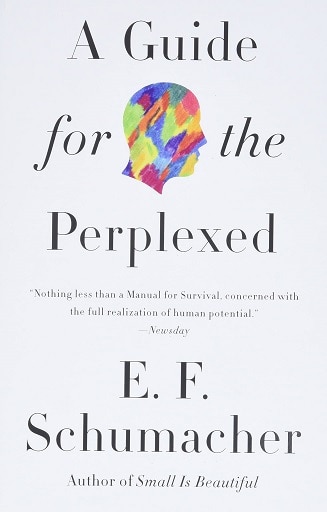| Title | A Guide for the Perplexed |
| Author | E. F. Schumacher |
| Publisher | Harper Perennial |
| Year | 2015 |
| Pages | 176 |
| Rating | ★★★★★ (5 stars) |
| Purchase Link | Buy Here |
A Guide for the Perplexed is a book written by EF Schumacher that teaches that man has lost sight of a deeper view of the world.
As such, this book is essential for those who feel uneasy about today’s Cartesian and scientistic world. Read more book summaries clicking here.
What is the Synopsis of A Guide for the Perplexed?
So, what’s this book about? I’ll give you a brief synopsis before continuing.
In this book, EF Schumacher tells us that the purely scientific view of the world ends up taking away from us a deeper understanding of reality and of human beings, and that it is urgent that we recover this more integral view of everything that surrounds us.
Because of this, I think this book is extremely recommended for modern readers. You can purchase the A Guide for the Perplexed clicking here.
Who is the author of A Guide for the Perplexed?
This book is a product of a great mind, and it’s very sad that many people don’t know him.
The author of A Guide for the Perplexed is academic Ernst Friedrich Schumacher, a renowned scholar in the fields of economics and statistics. In his last years of life, he was influenced by the ideas of Catholicism: it was when he wrote the present work.
This author’s name isn’t that known compared to other authors, but you’ll be surprised by his works! Read a summary about Meditations (Marcus Aurelius) here.
What is the Summary of A Guide for the Perplexed?
This book might seem complex in the beginning, but I’m sure you’ll get the hang of it. I prepared a summary of the book to hep you:
In this book, Schumacher talks about the predominance of a scientific worldview, which places human beings as one of the many animals in nature. Even though man has this nature, he goes much further: there is the possibility for him to develop and go beyond his animal capacities. Therefore, it is necessary to absorb what is best in our culture (as is the case of good literature) in order to train our morality and our sense of right or wrong.
Thus, the reductionist knowledge of the scientific view of the world does not give rise to a deeper knowledge, which allows the search for the good and the correct. For this, we need to develop our interior.
So, we must understand ourselves and also understand how people see us, so that we can act charitably towards others. Read a summary about On The Shortness of Life here.
In addition, we must try to understand how other people feel inside, something that is completely outside our current thinking.
In this way, we need to develop an inner world, something possible through the practice of virtues, the search for faith and the cultivation of philosophical faculties, which allow us to understand much more about reality.
What Are the Main Lessons of A Guide for the Perplexed?
The main lessons of A Guide for the Perplexed are:
1. The world has a hierarchical structure
First, even if the modern mentality considers that all beings are equal, it is true that there is a hierarchy between individuals.
Therefore, the hierarchy is divided as follows:
- Mineral: has matter and does not have life.
- Vegetal: has matter and life, but does not have consciousness.
- Animal: it has matter, life and consciousness, but it does not have awareness of itself (that is, it does not know that it knows).
- Human: it has matter, life, consciousness and self-awareness (that is: it knows that it knows), being the most complete of all.
So, it is clear that the human being is the apex of the material hierarchy on our planet, being superior to other species. Read a summary of Chesterton’s book “What is Wrong with the World?” here.
2. Scientific knowledge is limited
Many people think that science is the only type of knowledge that can resolve our problems. However, it’s not like that.
Even if evolutionary thinking places man as just another link in the chain, it is clear that he has capabilities far beyond other beings. Therefore, scientific thought is not able to give the whole truth about human existence. In fact: this is because science is concerned only with material issues – and there is no problem with that, since that is its function.
However, there is a big problem with the scientific interpretation of life, which places all of reality only as material issues, forgetting that there is an immaterial side that science cannot encompass.
Because of this, science ends up being a very limited understanding of reality when used in isolation.
Thus, we must recover a more spiritual sense of life to understand the true human dramas, such as the concepts of good and evil, the need to seek virtues, etc. Read a summary about The Screwtape Letters, by C. S. Lewis, here!
3. We need to acquire virtues
In fact: the human being is much more than a rational animal, since he can progress morally, if he so desires.
The best-known religious and philosophical traditions show us the other side of the human view: we must seek strengthening so that we can deal with difficulties. Thus, we must seek to progress in the virtues through giving to others and understanding ourselves. This is what the author defines as adequatio: we must make an effort to adapt to the deepest truths, even if this process is difficult.
However, most people are little different from animals, being guided by our lowest and bestial instincts.
For example: most of us humans only think about running away from pain and seeking pleasure. The result is that when we have the slightest difficulty, we are not able to overcome it. You can purchase the A Guide for the Perplexed clicking here.
4. We must know ourselves inside and out
We always hear about getting to know ourselves, but what does it mean really?
Most people don’t seek to have a deeper understanding of themselves, not even understanding how people view their actions. Therefore, we must try to understand our interior: what are our dominant defects and what do we tend to do well? How can we reduce our defects and enhance our qualities? In addition to understanding our inner feelings – something few people are willing to do – we must also understand what people think of us.
I’m not saying that we should care about appearances, but that sometimes we can’t communicate what we want correctly to people
We must try to understand how the person will receive what we say and how he will interpret it. Thus, our human relationships will improve a lot. Check our other book summaries by clicking here.
5. We need to understand how people feel
When we get to know ourselves better, it might be a problem if we don’t try to look at other people.
In fact: in addition to understanding ourselves, we need to start understanding more about the people around us. For example: most of the time, we only see the outside of people, without trying to understand what they are feeling to talk and act the way they talk and act.
Therefore, we must understand the human spirit more deeply, something that is discounted by many in today’s scientific world.
6. It is necessary to learn from tradition
In order for us to understand other people more deeply, we must seek all the best that has been produced by humanity.
The greatest works of geniuses can be found in two sources that are much neglected today: The first is literature: through good works, we manage to understand how people behave and think in different situations. The second is religious tradition: with the study of religion, we can understand people’s inner motivations, as well as exercise our donation so that we love it more.
I add here that this is also valid in good films, as well as other media that allow for deeper narrations.
Despite being Catholic, the author makes several references to different religious traditions, such as Catholicism, Eastern Christianity, Buddhism and Hinduism, showing that all can teach us valuable lessons.
7. Give yourself to others
Humans are very selfish nowadays, and I know you might think the same thing.
Because of this, we shouldn’t just stop at internal knowledge of ourselves and philosophical and historical concepts: we need to act. Therefore, we must exercise our charity and, through it, better understand other people and help in whatever is necessary.
In this way, we manage to progress in virtue and then we become better people.
What are the Negative Points of A Guide for the Perplexed?
I have a little problem with this book, so I’ll tell you right away.
The negative points of A Guide for the Perplexed are, mainly, the fact that this is not such an easy book to read: you have to read it slowly and patiently, as the content is quite deep.
Furthermore, anyone who is not familiar with certain concepts of the thought of Aristotle, St. Thomas Aquinas and does not have a knowledge of Christian doctrine may have some reading difficulties.
However, this is not something that prevents reading: just make a little more effort to understand the teachings of the work and, if necessary, seek references in other sources.
What Are the Positive Points of A Guide for the Perplexed?
This book has so many good points that it’s difficult to list all, but I’ll try.
The positive points of A Guide for the Perplexed are many: first, the work has a division into chapters that follows a very logical thought. In addition, the work shows several interesting bibliographical references for those who want to delve into some concepts that the author addresses superficially.
Although the work is not so easy to read, it explains everything in a very detailed way. Whenever I had any doubts, I just paid more attention and reread the previous paragraphs to understand better.
Finally, I cannot fail to mention the fact that the book has extremely relevant content, and that its teachings need to be known by people. Check our other book summaries by clicking here
Is A Guide for the Perplexed worth reading?
Is this book worth reading, in the end? I will answer you now.
A Guide for the Perplexed is well worth reading. The book teaches many things that current humanity ended up forgetting. Therefore, this book is worthwhile for all those who see value in rescuing certain values of philosophy and religion that were left behind.
If you are interested in purchasing A Guide for the Perplexed, you should do so now! You can purchase the A Guide for the Perplexed clicking here.

